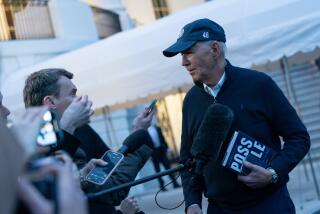Bernard Diamond; Expert on Psychiatry and the Law
Bernard L. Diamond, a psychiatrist and legal scholar who introduced the concept of “diminished capacity” to courtrooms, arguing that murder defendants suffering from serious mental impairment should not be punished under the standard criteria of law, has died.
UC Berkeley spokesman Jesus Mena said Tuesday that the university’s distinguished emeritus professor of law and psychiatry had died Sunday at Marin General Hospital in Greenbrae, Calif., of emphysema and heart failure.
He was 77 and had suffered a heart attack two weeks ago.
Perhaps Diamond’s best-known testimony came during the trial of Sen. Robert F. Kennedy’s assassin, Sirhan Sirhan.
Diamond argued that the trauma Sirhan had suffered during the bombing and shelling of his homeland during the Arab-Israeli war had seriously impaired his mental faculties.
He said Sirhan had placed himself in a trance during Kennedy’s 1968 slaying and should be judged outside the parameters used for “normal” murderers. Sirhan was convicted of Kennedy’s killing and is serving a life sentence.
Diamond’s arguments for diminished capacity were put to use in many U.S. courtrooms but were struck down by the California Supreme Court in 1982.
“In order to be guilty of a crime, there must be a guilty mind,” Diamond would say.
Diamond, a native of San Francisco, also was an expert regarding the effects of hypnotic suggestion on courtroom testimony.
The author of more than 40 articles in major professional journals, Diamond was opposed to the use of testimony from witnesses whose recollections of events had been “freshened” under hypnosis.
An example came during Sirhan’s 1969 trial, when Diamond testified that he had hypnotized Kennedy’s killer and had him relive the murder in the kitchen at the Ambassador Hotel in Los Angeles. He found that Sirhan could not recall the shooting of the 1968 presidential candidate unless he was under hypnosis and theorized that Sirhan’s hypnotic remembrance of the assassination--in which Sirhan had convinced himself that he merely wanted to shake Kennedy’s hand and not shoot him--could have been a lie.
He retired in 1980 but continued teaching until last year.
Just before his death, he had begun planning a children’s program of interactive exhibits at UC’s Lawrence Hall of Science to explain the effects of drugs and alcohol on the mind--a project the institution expects to complete.
Diamond is survived by his wife, Ann Landy Diamond, a son and five daughters.
More to Read
Sign up for Essential California
The most important California stories and recommendations in your inbox every morning.
You may occasionally receive promotional content from the Los Angeles Times.










